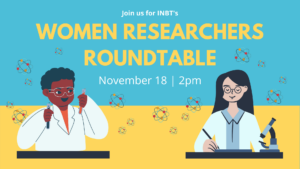
Join other women researchers for a discussion on the challenges women in STEM experience, and how to overcome them. Share your experiences, network, and learn from one another.
This is your chance to asked established women researchers questions you always wanted to ask in a safe and non-judgemental atmosphere. Claire Hur, Daniele Gilkes, and Karen Eisinger will share their experiences, advice, and challenges facing women in STEM. Come with question or listen to the discussion.
About the speakers
- Soojung Claire Hur is the Clare Boothe Luce Assistant Professor of Mechanical Engineering and associate faculty member at the INBT.
- Daniele Gilkes is an assistant professor in the Oncology Department, under the Breast and Ovarian Cancer Program, at Johns Hopkins. She is also an associate faculty member at the INBT and a researcher at the Johns Hopkins Physical Sciences-Oncology Center.
- Tzipora Sarah Karin Eisinger is the Ann B. Young Assistant Professor in Cancer Research University of Pennsylvania Perelman School of Medicine. She is also a researcher in the Johns Hopkins Physical Sciences-Oncology Center.
Registration
Register for the event on Eventbrite. Registration closes 11/17/2020 at 4:30 pm. A Zoom link and passcode will be emailed to registrants the day before the event. Anonymous questions, comments, and experiences can be submitted prior to the event.
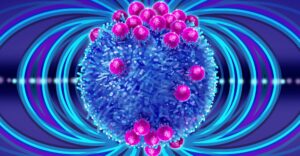
The Johns Hopkins Translational Immunoengineering is hosting a workshop series in January.
The field of immunoengineering combines the diverse and complex fields of engineering and immunology and is transforming patient treatment in cancer, autoimmunity, regeneration, and transplantation. There is a significant need for training of engineers in immunology and for training immunologists in quantitative engineering techniques. Moreover, there is need to bridge basic immunological discoveries with advances in clinical application. This course will review the fundamentals of the immune system and its components, engineering strategies to modulate the immune system, and clinical applications. This workshop series is also being offered for CME credit and as a two-credit course for Hopkins students.
Go to their website to see schedule, speakers, topics, and registration information.
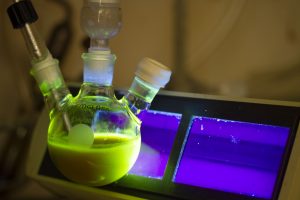
Join people at the Whiting School of Engineering during the week of February 21 through 27 for their annual celebration of engineering and the difference it makes in our world! Scheduled events are subject to change. All events are being held virtually. Register for events on the WSE website.
Aerospace Exploration – Monday, February 22
Tower of Power – Tuesday, February 23
Virtual Symposium on Human Spaceflight – Wednesday, February 24
Oil & Energy Panel – Wednesday, February 24
Speed Networking Night – Thursday, February 25
We welcome students to join the spring information session about our Masters Industry Co-Op program.
The information session will explain how the program provides students with career training while employed with an industry partner. Students gain work experience, network, and build technical skills that prepares them for a competitive job market. Plus, students earn a salary and receive college credit during employment. This program is open to engineering students in chemical and biomolecular engineering, materials science and engineering, and mechanical engineering. Go our Masters Co-Op webpage to learn more and then come with questions to session.
*The Co-Op program is still active during the COVID-19 pandemic offering both in-person and virtual experiences.*
Register for this event on Eventbrite. A Zoom link will be emailed the morning of the event. The event will be held in Eastern Standard Time.
Stem Cells for Cardiovascular Tissue Engineering and Repair
Please join to meet Yibing Qyang, associate professor of medicine (cardiology) and of pathology from Yale University.
Abstract: Mechanically robust vascular grafts are in urgent clinical demand for treating cardiovascular diseases or providing hemodialysis access. Vascular smooth muscle cells (VSMCs) can be derived in large numbers from human induced pluripotent stem cells (hiPSCs) for producing tissue-engineered vascular grafts (TEVGs). We will discuss the generation of hiPSC-derived TEVGs with mechanical strength comparable to native vessels used in arterial bypass grafts by utilizing biodegradable scaffolds, incremental pulsatile stretching, and optimal culture conditions. Following implantation into a rat aortic model, hiPSC-TEVGs show excellent patency without luminal dilation and effectively maintain mechanical and contractile function. To develop readily available vascular grafts, we have decellularized hiPSC-TEVGs based on an efficient decellularization approach. We have also successfully endothelialized decellularized hiPSC-TEVGs with hiPSC-derived ECs (hiPSC-ECs) under shear stress in a flow bioreactor. Immunologically “universal” hiPSCs will be discussed in order to make hiPSC-TEVG readily available for vascular treatment. Finally, the progress on exploring TEVGs as a potential treatment for single ventricle congenital heart defects will be shared. These studies may provide a foundation for future production of non-immunogenic hiPSC-TEVGs for treating cardiovascular diseases.
Biography: Yibing Qyang obtained his B.S. degree from the Department of Biochemistry, Nanjing University, China and subsequently pursued graduate studies at the Institute of Microbiology, Chinese Academy of Sciences. Then he joined the Department of Molecular Genetics, University of Texas M.D. Anderson Cancer Center. After receiving his M.S. degree from Dr. Michele Sawadogo’s laboratory, and his Ph.D. from Dr. Stevan Marcus’s lab, he spent the next year conducting postdoctoral research at Baylor College of Medicine, where he studied myeloproliferative diseases with a mouse model of presenilin deficiency. He next joined Dr. Kenneth R. Chien’s laboratory at the University of California, San Diego and then the Cardiovascular Research Center, Massachusetts General Hospital, Harvard Medical School and Harvard Stem Cell Institute. He has been studying the renewal and differentiation of cardiovascular progenitor cells, marked by Isl1, a LIM-Homeodomain transcription factor, as well as cardiovascular disease mechanisms using human stem cell and animal models. In October 2008, Dr. Qyang became a principal investigator at the Yale Cardiovascular Research Institute and Section of Cardiology, Dept. of Internal Medicine, and Yale Stem Cell Center. Since 2010, he has been Director of the Yale Stem Cell Research Forum.

Zoom Information
Meeting URL: https://wse.zoom.us/j/93684553880
Meeting ID: 936 8455 3880
By Telephone
Dial: US: +1 301 715 8592 or
+1 312 626 6799 or
+1 646 558 8656 or
+1 346 248 7799 or
+1 669 900 6833 or
+1 253 215 8782
Meeting ID: 936 8455 3880
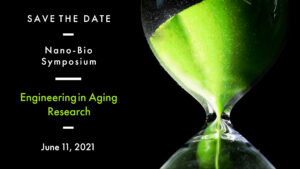
Please join us for the 14th Annual Nano-Bio Symposium on Engineering in Aging Research. Census data from the United States projects that by 2050 the 65 year-old population will double and about 20% of the population will be over 60 years old. A rapidly aging world is expected to induce socio-economic burdens, including age-associated diseases, disabilities, multi-morbidities, polypharmacy, and healthcare costs. Engineers are positioned to explore and provide solutions to these challenges and more to promote healthy aging and well-being.
See the full agenda, speakers, and register for the symposium.
An online event for for underrepresented graduate students in STEM at Hopkins
This workshop is the first in a three-part series for underrepresented graduate students in STEM at Hopkins to help them grow their digital presence among their peers, the public, and future employers.
Scholarly identifiers help researchers establish their presence among peers and is part of their digital identity. Identifier platforms such as Scopus, Google Scholar, and ORCID can track a researcher’s scholarly output and impact, establish them among other researchers with similar names, and more. They are also used by other organizations as well such as funders for grant applications and scholarly publishers.
However, college students are unfamiliar with them and unsure how or where to get started using the platforms. If you are new to author identifiers or want learn more about them, join our workshop with scholarly communications expert Robin Sinn.
The event will be held virtually on the Zoom platform. Registration is required and closes at 12:00 pm on June 20, 2021. A Zoom link will be emailed to you the day before and the day of the event.
About our Speaker: Robin Sinn (she/her/hers)
Robin Sinn is a librarian in the Milton S. Eisenhower Library in the Office of Scholarly Communications. Sinn’s areas of expertise are publishing trends, open access, and copyright.
The workshop series is made possible by The Gilliam Fellowship for Advanced Study at the Howard Hughes Medical Institute. The goals of the Gilliam program are to ensure that students from groups historically excluded and unrepresented in science are prepared for leadership roles in science.
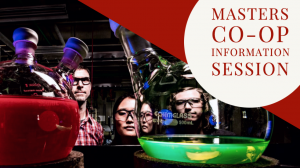
Please join us for a virtual information session to learn about the INBT’s Masters Industry Co-Op Program.
To broaden the practical training for Master of Science in Engineering (MSE) students in the Whiting School of Engineering, INBT collaborates with major industry partners to offer students a six-month Co-Op opportunity that provides industry experience, a salary, and college credit. This program is currently only available to students in the Departments of Materials Science and Engineering, Mechanical Engineering, and Chemical and Biomolecular Engineering.
Go to the Masters Co-Op website to learn more about the program.
*The Co-Op program is still active during the COVID-19 pandemic.
This event will be held via Zoom and students can log in here.
Webinar ID: 946 8492 6515
Telephone: Dial by your location
+1 301 715 8592 US (Washington DC)
+1 646 558 8656 US (New York)
+1 312 626 6799 US (Chicago)
+1 346 248 7799 US (Houston)
+1 669 900 6833 US (San Jose)
+1 253 215 8782 US (Tacoma)
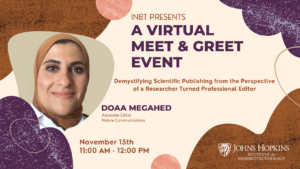
Demystifying Scientific Publishing from the Perspective of a Researcher Turned Professional Editor
Registration for this virtual event is required. A Zoom link will be emailed to registrants the day of and the morning of the event.
Join us for a virtual meet and greet with Nature Communications editor Doaa Megahed. Doaa will discuss the publication process at Nature journals and Nature Communications in particular. During the session the audience can ask questions about the editorial process, what it’s like to be an editor, and more.
In preparation for the event, the guest speaker has a survey for attendees to gather their interests and insights about scientific publications.
Biography
Doaa Megahed (aka Douaa Mugahid) has been an Associate Editor at Nature Communications since September 2020, where she handles computational and systems biology-related papers. Prior to that she was a post-doc at the Department of Systems Biology at Harvard Medical School, where she used a variety of methods to understand the role of YAP as a regulator of non-cell autonomous signaling in the liver and in cultured cells. As a graduate student at Heidelberg University and the Max Delbrueck Center in Germany she studied how hibernating bears avoid the loss of muscle mass. She was part of the inaugural class of Heidelberg University’s Master’s program in Systems Biology, and has been a member of the systems biology community ever since. She continues to serve science by advocating for papers that advance human knowledge, democratize scientific research, and improve scientific reproducibility.
Megahed is passionate about education and mentorship, which is why she serves as COO of Maqal 3elmy, an initiative that makes science accessible to the Arab world through pop-science pieces. She also volunteers with the Journal of Emerging Investigators. In this capacity she coordinates their Ask-A-Scientist program through which students get to ask questions related to science and the publication process. She is also one of JEI’s proofing editors, and an occasional reviewer.
When not doing any of the above Megahed enjoys reading, traveling, spinning, running, crafting and upholstering old furniture.

The Johns Hopkins Translational Immunoengineering is hosting a workshop series every Tuesday and Thursday in January.
The immunoengineering field is transforming cancer, autoimmunity, regeneration, and transplantation treatments by combining the diverse and complex fields of engineering and immunology. There is a significant need to train engineers in immunology and immunologists in quantitative engineering techniques. Moreover, there is a need to bridge basic immunological discoveries with advances in clinical application. This workshop will review immune system fundamentals and components, engineering strategies to modulate the immune system, and clinical applications.
After attending this workshop, the learner will demonstrate the ability to:
– Review the fundamentals and recent discoveries in the function of the immune system.
– Identify engineering strategies to manipulate the immune system.
– Describe the clinical applications of immunoengineering.
Go to their website to see schedule, speakers, topics, and registration information. Register by December 30, 2021. A late fee is applied for registering after the deadline.
This workshop is eligible for CME credit and offered as a two-credit course for Johns Hopkins students.


